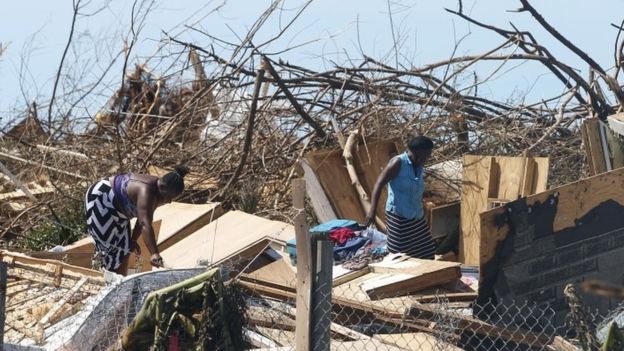
Hurricane Dorian: Bahamas death toll expected to be ‘staggering’
- The death toll from Hurricane Dorian in the Bahamas will be "staggering", the country's government has warned as aid efforts are being stepped up.
The death toll from Hurricane Dorian in the Bahamas will be “staggering”, the country’s government has warned as aid efforts are being stepped up.
The official death toll stands at 30, but is expected to rise further.
Officials are sending morticians and 200 body bags to the Abaco Islands, the worst-hit part of the archipelago.
Dorian – which devastated the northern Bahamas from Sunday to Tuesday – is now battering the coasts of South and North Carolina in the US, but is weakening.
Officials say hundreds, possibly thousands, are still missing in the Abacos and Grand Bahama.
On Thursday Health Minister Duane Sands warned of a “staggering” final count.
“The public needs to prepare for unimaginable information about the death toll and the human suffering,” he told local radio.
Dorian hit the Bahamas as a category 5 hurricane with winds reaching 185mph, matching the highest ever recorded at landfall, and stayed over affected areas for two days.
What is the damage to Bahamas?
The International Red Cross fears 45% of homes on Grand Bahama and the Abacos – some 13,000 properties – were severely damaged or destroyed.
Parts of the Bahamas received up to 35in (89cm) of rain, leaving vast areas of it flooded.
The Island of Great Abaco is virtually uninhabitable, with bodies piled up, no water, power or food, and militias formed to prevent looting, local media report.
Aerial images over the Abacos showed mile upon mile of destruction, with roofs torn off, scattered debris, overturned cars, shipping containers and boats, and high water levels.
The only international airport in Grand Bahama was devastated.
What is the latest on the aid effort?
International aid operations have been primarily focused on Grand Bahama and the Abacos.
Search-and-rescue teams have been combing the worst-hit communities looking for any trace of survivors and bodies. As of Thursday, the US Coast Guard said it had rescued 201 residents.
Meanwhile, efforts to deliver aid are being ramped up. Planes and helicopters have been flying in emergency supplies to help the estimated 76,000 people in need of food and shelter.
Eight tonnes (8,000kg) of ready-to-eat meals, storage units, generators and other emergency suppliers are to be flown in from Panama, the UN World Food Programme said.
A $5.4m (£4.3m) budget has been allocated to the UN agency for a three-month emergency operation in the Bahamas.
Where is Dorian now?
Now downgraded to a category 2 hurricane, Dorian is slowly churning north-east along the eastern US seaboard, where it still poses a threat.
The US National Hurricane Center (NHC) said that at 23:00 local time (03:00 GMT) Dorian was 35 miles (60km) south of Wilmington in North Carolina and moving north-east at about 13mph.
The US states of North and South Carolina are at risk of dangerous storm surges on Friday before the hurricane moves towards Nova Scotia at the weekend.
Is climate change making hurricanes worse?
Scientists cannot say whether climate change is increasing the number of hurricanes, but the ones that do happen are likely to be more powerful and more destructive because of our warming climate, says BBC Weather’s Tomasz Schafernaker.
Here’s why:
- An increase in sea surface temperatures strengthens the wind speeds within storms and also raises the amount of precipitation a hurricane will dump
- Sea levels are expected to increase by one to four feet over the next century, bringing the potential of far worse damage from sea surges and coastal flooding during storms



